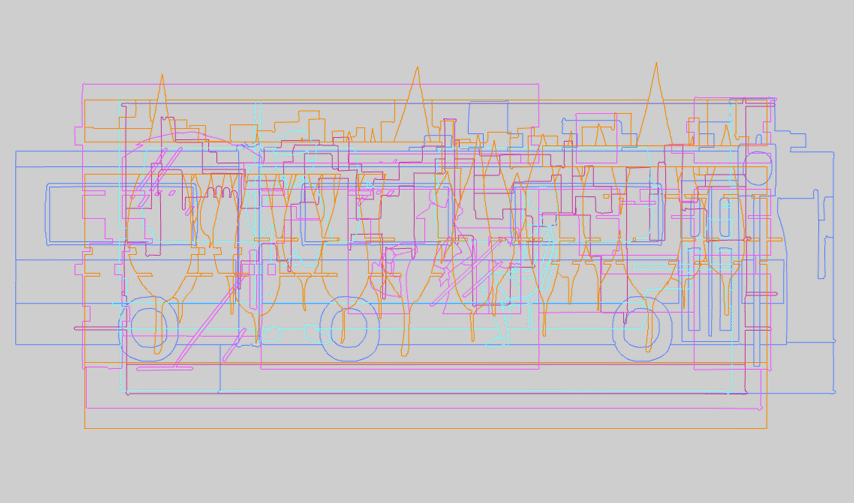ANIMAL’s feature Game Plan asks video game developers to share a bit about their process and some working images from the creation of a recent game. This week, we spoke with Dylan Carter about ALZ, a simple and brief game that accurately conveys something tragic and terrifying.
You go for a walk and suddenly have no idea where you are. What are these objects? Why do they seem familiar? Who are these people? Why are you scared? With simple dialogue and glitchy, ever-changing graphics, ALZ simulates the gut-wrenching experience of losing one’s identity.

ALZ is brief. It takes just a minute or two to see everything the game has to offer. You control a blank-faced, pink little man as he walks from place to place, the environment constantly shifting around him. He stops intermittently to wonder at his surroundings, gazing at nondescript objects and people—loved ones—he feels he should recognize, but simply doesn’t. He’s puzzled by all this, but seems more content than troubled. A sad piano score lingers throughout.
If you’ve known someone who suffers or suffered from Alzheimer’s, dementia or other cognitive disorders, then you know how accurate the game’s journey is. You’d guess that its creator, University of Texas at Austin student Dylan Carter, has firsthand experience with it—and indeed, his grandfather suffered from Alzheimer’s.

A concept sketch for ALZ.
“But that was before I was born,” Carter told Animal. “So It’s just kind of this ingrained fear I have in a very long-term sense.”
Is there anything more terrifying than forgetting who you are? Like the buildings and people that flit in and out of view in ALZ, that fear has hung over Carter’s head all his life. “It was mostly this general idea of going somewhere and having it be very kind of confusing and strange, but it was also true,” he said. “He doesn’t like the bus because there are a lot of people, and that’s kind of a thing that I have about just general social anxiety. I don’t like being in super-crowded places.”
But making ALZ helped him understand his feelings. “It ended up kind of becoming this weird cathartic experience where I was just working through all my fears on the subject,” Carter said.

Carter created the game for a game development competition called Stencyl Jam 2014. Stencyl is a game creation program with a relatively simple interface that doesn’t require any programming knowledge—helpful, since Carter has none. The competition, hosted on browser gaming site Newgrounds, gave participants four weeks to create an original game, but Carter, misunderstanding the rules, made ALZ over four days and “three sleepless nights.”
He spent the first day going through the program’s tutorials, learning the ropes. “The second 24 hours I was able to actually start creating a game from all of this. And then the last 24 hours was spent making it not completely broken,” he described.

As an animator by trade, he had never coded a game before. But he keeps a notebook full of dozens of ideas, many of which might be made into interactive experiences. The idea that became ALZ was originally for something that looked simply “glitchy”—like watching a movie on a scratched DVD—and “that kind of morphed into something about memory,” Carter explained. The way entire scenes appear and dissolve in the span of a second, the protagonist finding himself one moment at home, the next on a bus, no idea how he got there— “I thought that it was a very good visual representation of how someone might feel when they’re losing their memory,” he said.

Naturally he focused on his strength in animation, and the game went through multiple iterations, including a more “liquidy” version in which the graphics ebbed and flowed. He eventually settled on a jarring, hard-edged experience. But despite its visual sophistication, ALZ is incredibly simple. “I knew that I wouldn’t be able to create something that broke all the rules of gaming or anything like that,” Carter explained. “I also felt that that wasn’t really necessary to the game.”
Online, Carter describes ALZ as “a short game. Well, more like a short film. Well, more like an experimental short film in ever-so-slightly interactive of a format.” Whatever it is, it’s indescribably sad, especially if you relate to it on a personal level. “I’ve gotten emails from people who are just incredibly thankful that I’ve made this,” Carter said. “I’ve gotten people saying they’ve had tears in their eyes while they’re playing, which has just been an amazing thing to read.”

Many people have tried to imagine losing their memories at one time or another. But the onset of dementia is not like the sudden amnesia portrayed in many video games; you don’t simply wake up one day with an empty head. It’s a gradual process that can take years to fully manifest. But one day, a long time from now, you might leave the house and get lost walking to the bus. ALZ simply acknowledges that.
“Enjoy your walk,” the game’s instructions read. “Interact with your surroundings. Or don’t. Have a forgotten, but hopefully not forgetful, experience.”
You can play ALZ for free on Newgrounds.com right now.


